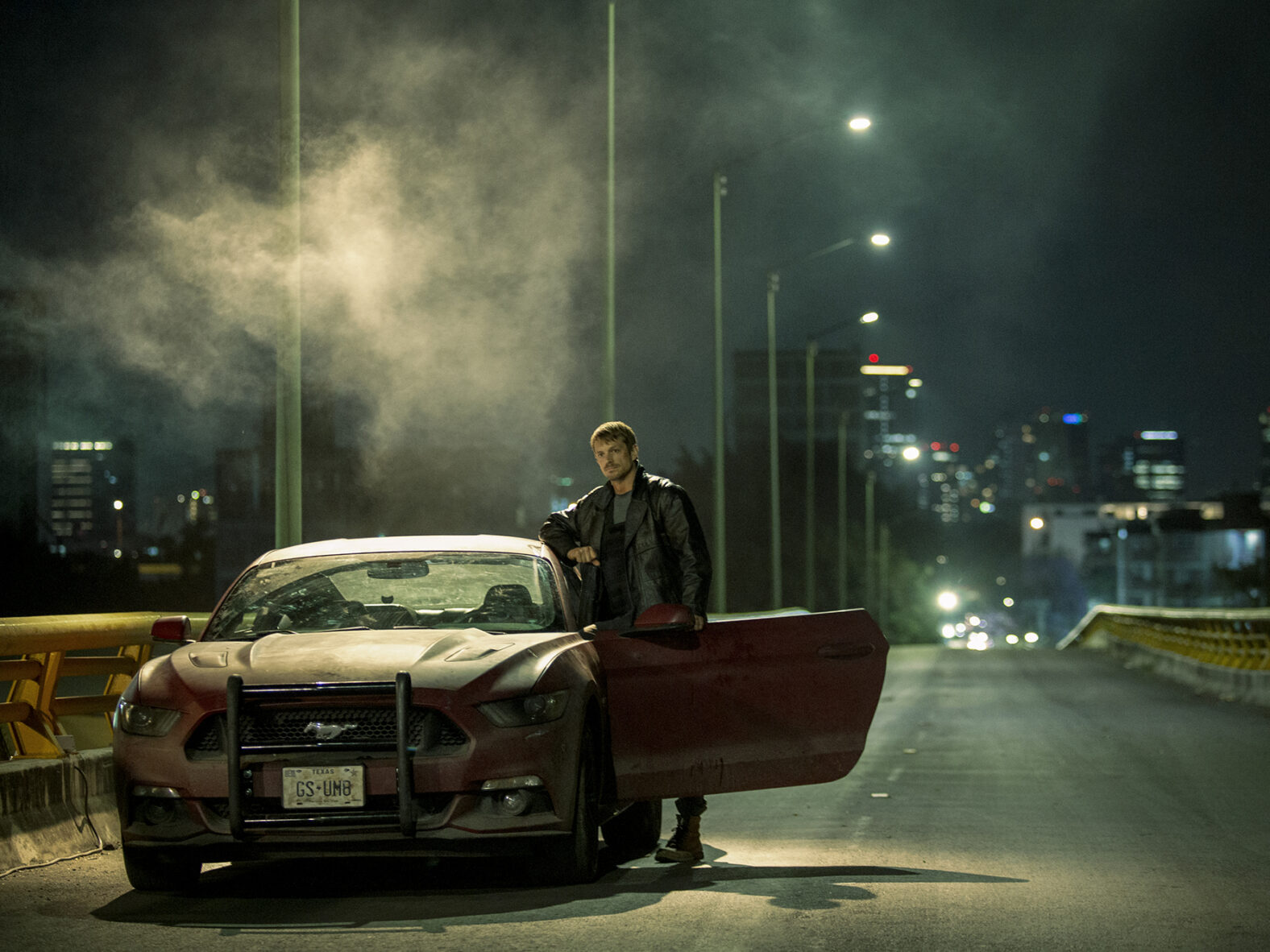It’s Christmas at the Godlock household and the festive cheer is palpable. Brian (Joel Kinneman) frolics in the yard with his son Taylor (Alex Briseño) and his wife Saya (Catalina Sandino Moreno) records their happy moments together. Right at that moment their peaceful suburban lives are shattered by a stray bullet from gunfire between rival gangs.
Brian sets off in blind rage after those who stole his son from him. Unfortunately, he is blindsided and attacked by GI-7 gang leader, Playa (Harold Torres). Brian is viciously gunned down including a shot to the throat and left for dead. In recovery for months, he begins to heal and realises the damage has left him unable to speak, not even able to scream out in agony. The investigating officer Detective Vassell (Kid Cudi) tries to help but the Godlocks are just one tragedy of many and the case goes nowhere.
Brian begins drinking, his relationship with Saya disintegrates as he refuses to move on from his pain or to acknowledge hers. With nothing else to live for, Brian has only one thing on his mind, revenge. Resolute, he intends for next Christmas to be one to remember. It’s currently April and he has months to prepare. He’ll turn himself into a one man killing machine to avenge his child. Brian won’t need his voice this Christmas, he’s going to let his trigger finger do the talking!
Director John Woo has rightfully cemented himself as a legend of action cinema. Throughout the 80s and 90s, he wowed audiences both in his native China and abroad with his distinctive visual flair and explosive violence. Pioneering the “heroic bloodshed” genre he revolutionised how we as audiences would see cinematic gun play forever more.
His transition to Hollywood, although long awaited, was hit and miss. Seeing classics like 1997’s ‘Face/Off’ but also duds like 2003’s ‘Paycheck’. After a 20 year absence from American films, John Woo returns to direct a script by Robert Archer Lynn, Silent Night. Stylish as ever, the film features almost no dialogue. Instead, focusing on expressive visuals, hard hitting sound design, and PLENTY of violent gunfights!
Films about revenge can come in all forms with many differing greatly in approach, Woo himself has made several diverse examples. Beyond that, very often the basic structure from one vengeance film to the next can be damn near indistinguishable. Silent Night‘s spartan technique boils the entire genre down to those brittle bones. Leading to a film loaded with John Woo‘s slick and emotive identity but very thin on story or character.
It would be unfair to say that there is no substance here whatsoever, you’ll just have to squint. We see the breakdown of the Godlock‘s marriage in the wake of their tragedy. Over the months rather than being celebrated family holidays such as Easter, these days are grotesquely spent by Brian training to kill. Saya‘s first Mother’s Day without her child is ignored. Even the eventual Christmas deadline (pun intended) is chosen purely for its significance as the anniversary of Brian‘s horror. Many still debate whether ‘Die Hard’ is a Christmas movie or simply a film set during Christmas, I see those same discussions happening with Silent Night.
I find these elements of the revenge narrative interesting and wish they were explored further. Sadly, this is where the depth of Lynn‘s script ends as with little to no dialogue comes little to no character, plot or intrigue. But this allows director Woo to do the heavy lifting with his emotionally charged, expressionist handling of the material.
In some ways, Silent Night is like an arthouse work and may just be the most authentically John Woo film of the director’s entire Hollywood career. English speaking audiences may only know Woo for the gun violence, flowing camera angles and random bevies of doves from his more watered down Hollywood films. Make no mistake, all of this is present in Silent Night. It may take longer to get there than some action fans would like but the film’s explosive final half hour is as loud, brutal, and kinetic as one could hope for.
But it’s John Woo’s romanticised, dreamlike storytelling which can be seen in his best Hong Kong films. It can be sappy and even melodramatic but this is what makes classics like 1986’s ‘A Better Tomorrow’ and 1989’s ‘The Killer’ such hauntingly beautiful masterpieces. Silent Night‘s unconventional screenplay allows Woo to take us on a likewise sentimental journey which transcends language barriers.
To be honest, without John Woo, Silent Night would be a fairly mediocre action revenge film. But thankfully, with his masterful skill, Woo elevates the picture to another level altogether. It may not be for everyone; the film is deceptively slow to build up to the action packed shootouts many seek. But those with wider understanding of John Woo’s films beyond the gunfights are in for a real treat as he delivers an experience quite different to anything else you’re likely to see from Hollywood cinema today.
